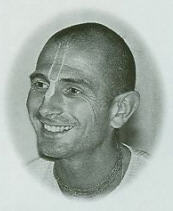
Rohininandana Dasa
I REMEMBER PEEPING as a small boy around the edge of the door to my father's room. I would see him kneeling in front of a chair, his elbows resting on the seat, his hands clasped, his thumbs touching his bowed forehead, his eyes closed. I felt awed. He seemed to be in another world, a private world.
For a while I used to kneel beside my bed to pray at night. My prayers mostly consisted of thanking God or asking Him for something. I also went with my father to church on Sundays, while my mother stayed home to cook lunch. When we returned home, we said grace before we ate the Sunday roast.
You can imagine how I felt the day I first saw Hare Krsna devotees in London, chanting and dancing their way down Oxford Street, and read that the Hare Krsna mantra is the "great prayer for deliverance." Amidst the noise and bustle of the street, the devotees loudly sang Hare Krsna, Hare Krsna, Krsna Krsna, Hare Hare/ Hare Rama, Hare Rama, Rama Rama, Hare Hare, while they danced, ran, spun around, and leapt into the air. How could such exuberance and extroversion be prayer?
Yet somehow it seemed a natural and fitting way to hallow the name of God. The devotees were not shy about honoring and glorifying God's name or sharing their joy.
As I became more familiar with Krsna consciousness, I understood that prayer is a way to associate directly with the Lord. By making heartfelt requests, by thanking Krsna for His blessings, or by glorifying His wonderful personality and activities, devotees forever rejoice in the Lord's company. Ultimately, prayer is an unceasing expression of love of God, an inseparable aspect of a devotee's existence.
Srila Prabhupada tells us to try to mold our lives in such a way that we constantly remember Krsna. He gives us the example of a woman whose hair is freshly and elaborately styled: She may be doing housework, but she always remembers her hair. Similarly, although a devotee may act in many ways, he never forgets Krsna.
A devotee prays according to his spiritual advancement. Srimad-Bhagavatam recommends we worship the Supreme Lord whether we have no desires or are full of them, in which case we can learn to depend on Krsna for their fulfillment. As we learn the art of prayer, we will gradually become pure devotees, without hankering any more for material things.
Krsna enjoys taking care of us, as parents enjoy caring for their children. When we gain confidence that Krsna is totally reliable in His promise that He will supply all life's necessities, we will naturally stop praying for material things and instead want to reciprocate Krsna's kindness.
Although a pure devotee does not want anything from Krsna, he has no other shelter or support than the Lord, so he naturally calls out to Him. When Lord Caitanya (Krsna Himself in the role of His own pure devotee) traveled alone as a sannyasi, He used to sing, "O Lord Krsna, please protect and maintain me. O Lord Rama, descendent of King Raghu, please protect me. O Krsna, killer of the Kesi demon, please maintain me."
The Srimad-Bhagavatam is a storehouse of prayers offered to the Lord by the most elevated devotees in universal history. Srila Prabhupada recommends we select prayers relevant to us and recite them, both for our purification and to learn how to pray to Krsna. Among others, Srila Prabhupada recommended Prahlada Maharaja's prayers to Lord Nrsimhadeva (Canto Seven) and Queen Kunti's prayers to Lord Krsna (Canto One).
Besides repeating the prayers of advanced devotees, we can offer our own. In a letter, Srila Prabhupada gives an idea of how to offer our own prayers: "Simply our prayer should be, 'My dear Lord Krsna, please remind me to always chant Your holy name. Please do not put me into forgetfulness. You are sitting within me as the Supersoul, so You can either put me into forgetfulness or cause me to remember You. So please do not put me into forgetfulness. Please always remind me to chant. Even if You send me to hell, it does not matter, just so long as I am always chanting Hare Krsna.'"
The Hare Krsna maha-mantra is a request to be engaged in the Lord's service. It is a devotee's main prayer, and all other forms of prayer flow from it.
Rohininandana Dasa lives in southern England with his wife and their three children. Write to him in care of Back to Godhead.
